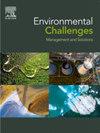Reusing treated wastewater and biosolids in urban agriculture: Social feasibility of a decentralized approach for underserved settlements
Q2 Environmental Science
引用次数: 0
Abstract
Urban poverty and water pollution are interconnected challenges that severely impact the quality of life in cities, particularly among vulnerable populations. Wastewater generation is a significant issue associated with the expansion of informal settlements in developing countries. Given the growing interest in reusing wastewater for agriculture, this study assesses the social feasibility of introducing urban agriculture as a decentralized wastewater treatment approach in underserved areas of Colombo, Sri Lanka. A questionnaire survey was conducted in a selected underserved settlement to evaluate public willingness to use treated wastewater for farming as an irrigation source and biosolids. The results show that 62 % of participants are willing to use treated wastewater for irrigation, while only 40.4 % are open to using biosolids for fertilizer, highlighting the social feasibility of promoting urban agriculture in underserved settlements as a wastewater treatment technique. Binary logistic regression analysis and marginal analysis suggest that household size, interest in farming and motivation for farming have key influence on public willingness for use treated wastewater for urban farming actvities. The insights from this study contribute to academic discourse and offer practical guidance for policymakers and urban planners to understand the social acceptability of using agriculture as a decentralized wastewater treatment approach in urban underserved communities to promote sustainable wastewater management practices and reduce urban water pollution.
都市农业中处理过的废水和生物固体的再利用:服务不足住区分散化方法的社会可行性
城市贫困和水污染是相互关联的挑战,严重影响城市,特别是弱势群体的生活质量。废水的产生是与发展中国家非正规住区扩大有关的一个重大问题。鉴于人们对农业废水再利用的兴趣日益浓厚,本研究评估了在斯里兰卡科伦坡服务不足地区引入城市农业作为分散污水处理方法的社会可行性。在选定的服务不足的定居点进行了问卷调查,以评估公众将处理过的废水用于农业作为灌溉来源和生物固体的意愿。结果显示,62%的参与者愿意将处理后的废水用于灌溉,而只有40.4%的参与者愿意将生物固体用作肥料,这突显了在服务不足的定居点推广城市农业作为一种废水处理技术的社会可行性。二元logistic回归分析和边际分析表明,家庭规模、农业兴趣和农业动机对公众将处理后的废水用于城市农业活动的意愿有关键影响。本研究的见解有助于学术论述,并为政策制定者和城市规划者提供实践指导,以了解在城市服务不足的社区使用农业作为分散污水处理方法的社会可接受性,以促进可持续的废水管理实践和减少城市水污染。
本文章由计算机程序翻译,如有差异,请以英文原文为准。
求助全文
约1分钟内获得全文
求助全文
来源期刊

Environmental Challenges
Environmental Science-Environmental Engineering
CiteScore
8.00
自引率
0.00%
发文量
249
审稿时长
8 weeks
 求助内容:
求助内容: 应助结果提醒方式:
应助结果提醒方式:


